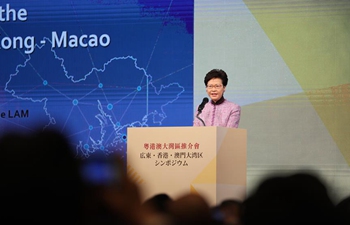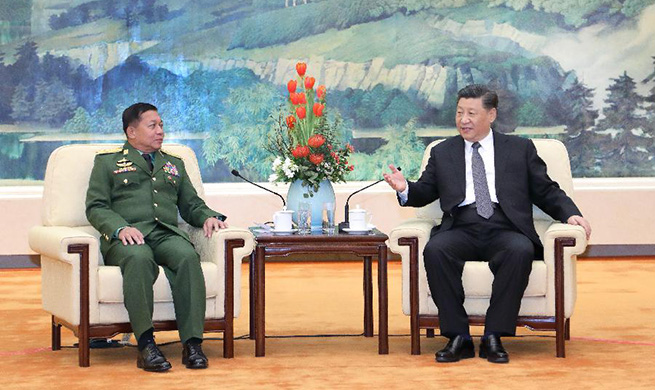ANKARA, April 10 (Xinhua) -- Turkey's Treasury and Finance Minister Berat Albayrak announced on Wednesday a long-awaited economic recovery plan focusing on the financial sector in an effort to bring the recession-hit country back to growth.
The plan aiming to boost investors confidence comes as Turkey faces serious economic problems, tensions with NATO ally the United States over Ankara's planned purchase of Russian S-400 air defense system, and a dispute over the mayoral elections in the nation's biggest city and economic hub Istanbul.
Turkey's economy had witnessed sustained growth for years but the country entered its first recession in a decade last month after a currency meltdown last summer, which resulted in a growing pile of bad debts for banks.
The Turkish lira has lost some 40 percent of its value since then and the inflation remains around 20 percent despite government measures announced in September to combat price hikes and high unemployment.
In a meeting in Istanbul, Albayrak said that the financial sector was to be prioritized in the new set of structural reforms that will apply for 2019 only.
"State-owned banks will get 28 billion lira (4.92 billion U.S. dollars) worth of government bonds as capital injection," in order to strengthen the banking sector, said Albayrak.
The minister also indicated that the government will widen the tax base and deal with unregistered economy to bring the ailing economy to safer grounds in line with budget discipline.
"We will reduce exclusions and exemptions in Turkey's new tax structure, and corporate tax will be gradually reduced. We will take steps to ensure fairer taxation on higher income groups that will have minimum effect on inflation," the minister announced.
Turkish voters in the two largest cities, Istanbul and Ankara, appeared to blame Erdogan's ruling Justice and Development Party (AKP) for the economic downturn and rising food prices, electing opposition candidates on the municipal elections on March 31.
The AKP has since disputed the Istanbul vote and called for a new election, causing concerns among investors.
The Turkish minister said that his country will launch a "National Unity Project in Agriculture," aimed at fighting inflation and especially food prices, adding that this project will be unveiled in May.
Albayrak furthermore said that government loans would prioritize strategic sectors, exports and value-added and local production.
He said that the government planned to integrate the country's severance pay fund with its private retirement insurance fund "to be more sustainable in order to support the economy."
"In the next five years, funds accumulated in the new retirement system will exceed 10 percent of the country's gross domestic product," the minister insisted.
Some analysts called on the Turkish government to take more drastic action to restore growth.
"My understanding about this announcement is that new taxes are on the way for citizens," commented economist Yalcin Karatepe from the Ankara university on Twitter.
Albayrak is expected to travel to Washington at the end of the week to attend meetings hosted by the International Monetary Fund (IMF) and the World Bank.
Erdogan ruled out several times that Turkey would have to knock at the IMF's door for a bailout plan as it did after the 2001 economic crisis.















